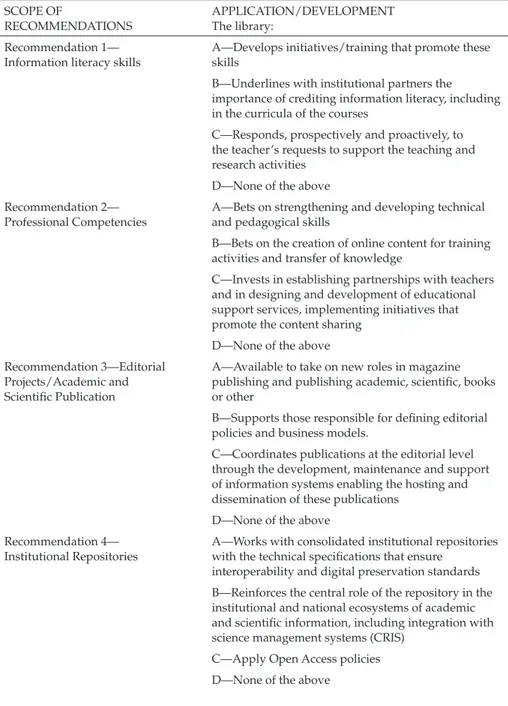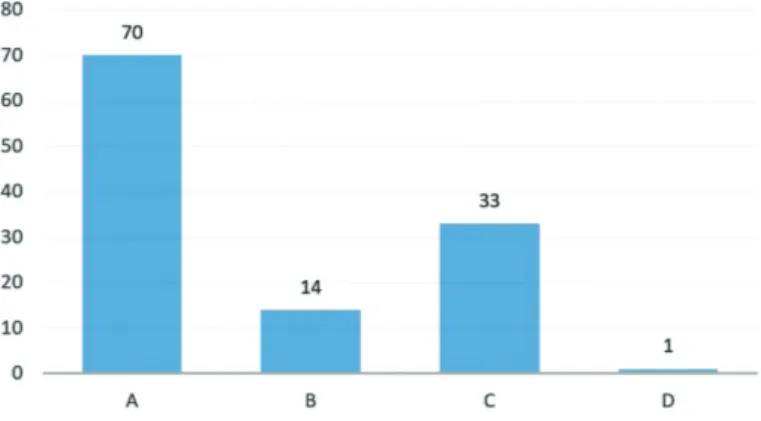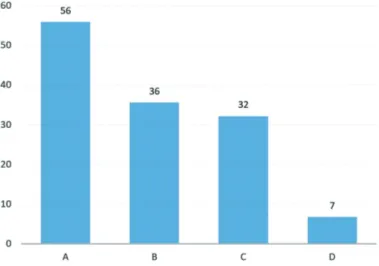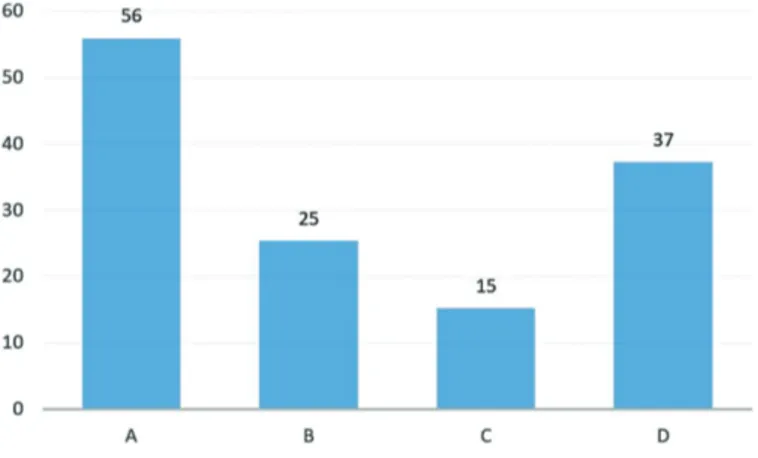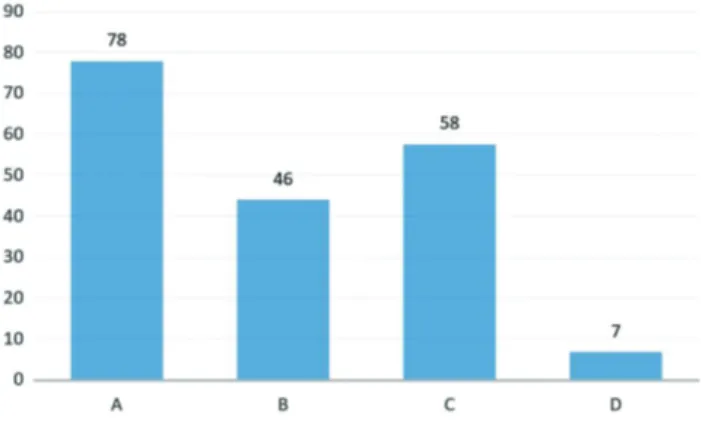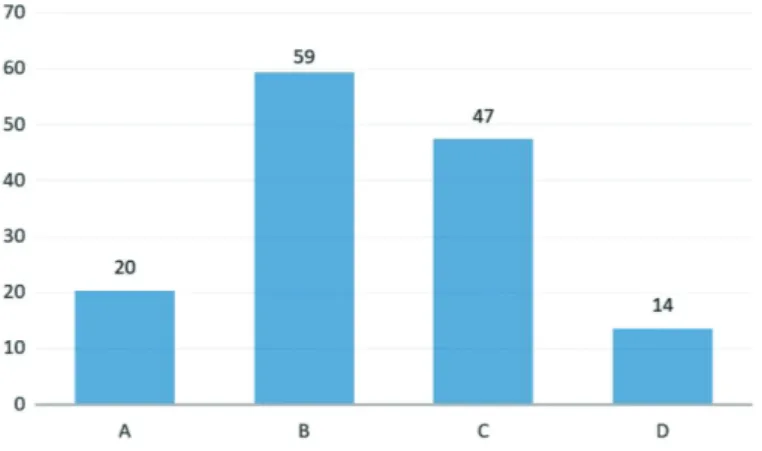Libraries in Portugal: Contributions to Assessment
Tatiana Sanches
UIDEF, Instituto de Educação, Universidade de Lisboa, Portugal
APPsyCI – Applied Psychology Research Center Capabilities & Inclusion, Lisboa, Portugal
tsanches@fpie.ulisboa.pt, orcid.org/0000-0002-4902-2628
Maria Teresa Costa
Faculdade de Letras, Centro de Estudos Clássicos, Universidade de Lisboa, Portugal
CIDEHUS, Centro de Estudos Clássicos, Universidade de Évora, Portugal maria.teresa@campus.ul.pt, orcid.org/0000-0003-4928-9047
Maria José Aurindo
Biblioteca Celestino Domingues, Escola Superior de Hotelaria e Turismo do Estoril, Portugal
mjaurindo@campus.ul.pt, orcid.org/0000-0003-4794-8950
Abstract
Three years after the publication and large-scale dissemination of the guideline document “Recommendations for Higher Education Libraries”, we seek to understand the extent to which this document has been adopted by librarians and how practices and experiences have been introduced in Portuguese higher education libraries. This paper aims to assess the application of the Recommendations on user training, particularly in infor-mation literacy; in digital content management, including data and scientific
production; and in the direct support to students, teachers and researchers, not forgetting topics of space management and information resources as a whole. For this purpose, a questionnaire survey was used for higher edu-cation libraries in Portugal. The most implemented areas are information literacy and the management of institutional repositories, and support for editorial projects was the one with the lowest level of application.
Keywords: Academic Libraries; Best Practices; Guidelines; Information Policies
1. Introduction
In a complex and changing world, information to manage increases exponentially, bringing new challenges for higher education institutions and information professionals. At the same time, library spaces take on new roles, responding to technological challenges, advances in open sci-ence, supporting key players in research and teaching, both as knowledge producers and transmitters. Three years ago, the Portuguese Association of Librarians, Archivists, and Documentalists collaboratively built the guid-ing document “Recommendations for Higher Education Libraries” (BAD, 2016). With the online publication and distribution to BAD associates and many professionals from Libraries and Higher Education, policymak-ers and tutelage, as well as the Ministry of Science and Higher Education, the Recommendations have become widespread. At the same time, sev-eral professionals were presenting, both nationally and internationally, the Recommendations (see Sanches & Costa, 2017). This movement reveals one of the working facets of this professional association, which through its Higher Education Libraries (HEL) Working Group, has sought to align strategies, develop projects and implement work tools, contributing to the affirmation and qualification of libraries and professionals of the area. On the other hand, these actions also have a purpose for contributing to the con-struction of public policies, intending to include in the Higher Education agenda the theme of its Libraries, and to create conditions of social interven-tion at the teaching and research level support.
From a non-exhaustive literature review, it appears that there are common concerns in several countries, to which the various institutions and stake-holders have sought to answer for some years. These organizations and
individuals have debated the future of higher education libraries, which include university and polytechnic libraries and research centres. Examples are Denmark’s Electronic Research Library in Denmark—DEFF (LimeGuild, 2009), Council on Library and Information Resources in the United States (CLIR, 2008), United Kingdom, Research Information Network and Consortium of Research Libraries [RIN & CURL] (Brown & Swan, 2007) and the United Kingdom and Ireland (RLUK, 2014) as well as several individual or collective researchers (Eden, 2015; Ross & Sennyey, 2008; Shorley & Jubb, 2013). These documents already raised inevitable questions about the imper-ative need for libraries to adapt to change, particularly at the technological level, particularly as regards communication and information sharing. The impact of these changes has been noticeable in adapting the skills of librar-ians, the partnerships these professionals promote, addressing different user needs, managing information systems, supporting publishing and the impli-cations of open access, and everything else, which involves the management and dissemination of scientific and academic knowledge.
More recently, several institutions have updated their documents, conducting prospective reflections that help us prepare the future. ACRL (2018) updated its Standards for Libraries in Higher Education. In this guiding document, the principles are based on the main functions performed by libraries and for their evaluation. The principles are converted into performance indicators that become measurable evidence through the results obtained, and that means a periodical evaluation. This evaluation concerns institutional effec-tiveness, professional values, educational role, discovery, collections, spaces, management, administration and leadership, staff and external relations. Also, RLUK (2018) recently presented its “Reshaping Scholarship Strategic Plan 2018–2021”. Only two strategic lines guide this plan for Research Libraries in the UK:
i) the open academy, which means fostering the creation of a new environment for research transformation (open communication systems where knowledge creators and users are connected);
ii) and a collective approach, which involves reconfiguring the modern collections of research libraries (new materials in conjunction with traditional ones must be collected, archived, preserved and made accessible for research and learning).
SCONUL (Pinfield, Cox, & Rutter, 2017), on the other hand, presents in the document Mapping the Future of Academic Libraries which are the areas of expertise that will shortly become preponderant. It shows the main trends: data management in academia; digital-based learning; user-centred and service-oriented libraries; mixed identities; collaboration and skills devel-opment; intensified contextual pressures. To address these trends, it recom-mends strategic partnerships; well-grounded electronic to printed media changes; significant and value-added digital spaces; the role of libraries in information discovery; digital humanities; artificial intelligence; internet of things; research data; establishing a vision; and a school culture that can enhance flexibility and innovation.
The Network of University Libraries in Spain (REBIUN, 2019) also focuses on approaching action scenarios, with REBIUN’s III Strategic Plan 2020. Moreover, it proposes the Technological Scenario, which implies a particular attention to innovation, content, services, and communication; the Learning and Research Scenario, which includes virtual learning, scientific information providers and personalized services; and the Alliance and Quality Scenario, which comprises strategies related to the academic libraries, interlibrary loan, collective cata-logues, scientific content, and internationalization. Through these three sce-narios, it summaries the lines of action for its associated libraries.
Finally, the European Association LIBER Europe (2017) presents the strate-gic plan Research Libraries Powering Sustainable Knowledge in the Digital Age (Strategy 2018–2022). It highlights platforms for innovative academic commu-nication, partnerships in research infrastructures and Centres for digital skills and services. These guidelines form intervention clusters associated with Open Access, FAIR research data, Cultural Heritage, and Digital Skills issues. Therefore, while this seems familiar to us at the European level, it is essen-tial to analyse the Portuguese reality, to prepare the future of the actions of higher education libraries in the country. In 2016, after a broad debate and discussion about the purposes and actions of these libraries, the Portuguese Association of Librarians, Archivists and Documentarists, through its Higher Education Libraries Working Group, consolidated and presented the final version of the Recommendations, which resulted precisely from the integration of all contributions collected in professional forums and work-shops. The 10 Recommendations, currently in force, focus primarily on four strands of library action, already explained in a previous study (Sanches & Costa, 2017):
• Support for teaching and learning, specifically to promoting information literacy skills;
• Support for research and scientific publication activities;
• Organizational management of partnerships and cooperation projects between libraries;
• The design and delivery of services, systems, and spaces that facilitate and enhance learning and discovery, and information management. We now present each of the 10 Recommendations, in its consolidated version:
1. Reaffirming the importance of information literacy skills in the academic community.
2. Developing library professionals’ skills to support teaching/learning activities.
3. Supporting editorial projects concerning academic and scientific publications.
4. Ensuring institutional repositories aligned with interoperability and preservation standards.
5. Creating support services for scientific data management. 6. Strengthening the library’s role in supporting research.
7. Encouraging partnerships with structures that support the academic community.
8. Promoting and facilitating access to information sources. 9. Reinventing and enhancing library spaces.
10. Deepening collaboration networks between professionals and institutions.
Three years after its widespread dissemination, it is crucial to consider the extent to which these recommendations have been implemented. To do that is observed the visibility and impact that this guidance document has had over the time if it has been in force and gathered the support of librarians, and how they convert it into services or resources available to users.
2. Methods
This study aims to understand the impact of the Recommendations for Higher Education Libraries at a national level, to verify how this guidance
document effectively constitutes a policy diffuser and implementer. By carrying out this monitoring, it is possible to obtain indications and sug-gestions to improve future documents of the same type. For this purpose, a questionnaire survey was sent to the 172 Portuguese Higher Education Libraries registered in the Directory (https://www.bad.pt/diretorio/). The questionnaire comprises aggregated data in 3 sections: library identification, recommendation characterization, and impact analysis. In this last aspect, it is intended to collect the information related to the actions developed around the ten Recommendations. The questions studied are presented in Table 1 and the answers were automatically collected in the Google Forms tool in early 2019.
For each recommendation, four response hypotheses were presented, aiming to measure the degree of involvement (gradually) of that recom-mendation. These questions sought to encourage the librarians to reflect on the applicability of the Recommendations in their professional practice (Table 1).
3. Results and Discussion
The questionnaire was answered by approximately one-third (59) of the Portuguese HEL (172) registered in the BAD Directory (https://www.bad. pt/diretorio). From those, 80% belong to the Public Higher Education, and 65% were Universities. Table 2 shows the distribution of libraries according to their typology.
The results obtained, form a representative sample from the geographic scope of the survey at the national level, as well as a well-proportioned sample con-cerning the types of schools in the country (military and police education, private and public polytechnics, private and public universities).
We have analysed each of the Recommendations regarding the receptivity they received. In general, the answers are very positive, revealing a signifi-cant impact of the Recommendations on the responding libraries.
The sequential analysis of each of the Recommendations allows us to observe their level of adoption demonstrated through the graph that represents the answers obtained, presenting each one separately for better analysis and interpretation.
Table 1: Questions concerning Recommendations application.
SCOPE OF
RECOMMENDATIONS APPLICATION/DEVELOPMENT The library:
Recommendation 1—
Information literacy skills A—Develops initiatives/training that promote these skills B—Underlines with institutional partners the importance of crediting information literacy, including in the curricula of the courses
C—Responds, prospectively and proactively, to the teacher’s requests to support the teaching and research activities
D—None of the above Recommendation 2—
Professional Competencies A—Bets on strengthening and developing technical and pedagogical skills B—Bets on the creation of online content for training activities and transfer of knowledge
C—Invests in establishing partnerships with teachers and in designing and development of educational support services, implementing initiatives that promote the content sharing
D—None of the above Recommendation 3—Editorial
Projects/Academic and Scientific Publication
A—Available to take on new roles in magazine publishing and publishing academic, scientific, books or other
B—Supports those responsible for defining editorial policies and business models.
C—Coordinates publications at the editorial level through the development, maintenance and support of information systems enabling the hosting and dissemination of these publications
D—None of the above Recommendation 4—
Institutional Repositories A—Works with consolidated institutional repositories with the technical specifications that ensure interoperability and digital preservation standards B—Reinforces the central role of the repository in the institutional and national ecosystems of academic and scientific information, including integration with science management systems (CRIS)
C—Apply Open Access policies D—None of the above
SCOPE OF
RECOMMENDATIONS APPLICATION/DEVELOPMENT The library:
Recommendation 5—Scientific
Data A—Designs scientific data management support services based on strategic intervention for institutional action that responds to management needs of data generated and collected in the activity of researchers
B—Understands the relevant role of research institutions in complying with the data policies of science funding bodies
C—Seeks to promote an open data culture that encourages sharing, identification, and citation of research data
D—None of the above Recommendation 6—Research
Support A—Encourages a relationship of trust and partnership with researchers in support of research, publication, and performance evaluation activity
B—Provides researchers with the tools necessary to increase the visibility of their scientific work at an individual and institutional level
C—Provides and interprets evaluation indicators to measure the impact of scientific production D—None of the above
Recommendation
7—Partnerships A—Actively and effectively develops partnerships with customer support structures and services to students, teachers, and researchers
B—Builds standard solutions that generate added value for the academic community
C—Empowers the development of innovative cross-cutting services
D—None of the above Recommendation 8—Sources
of Information A—Promotes and facilitates access to print and digital information sources available at the institution and other resources for teaching and research and disseminates them effectively and regularly B—Provides integrated systems that enable active information discovery
C—Includes bibliographic data of the library information systems in external aggregator systems D—None of the above
Recommendation 1—Reaffirming the Importance of Information Literacy Skills in the Academic Community
Affirming the need to develop Information Literacy in the academic com-munity, highlighting with institutional partners the importance of rec-ognizing information literacy skills, by including it in course curricula initiatives that promote these skills and ensuring that the Library responds,
Table 2: Characterization of responding libraries.
Higher Education Libraries
Military and Police Education 1
Private Polytechnic 2 Public Polytechnic 18 Private University 9 Public University 29 Total 59 SCOPE OF
RECOMMENDATIONS APPLICATION/DEVELOPMENT The library:
Recommendation 9—Library
Spaces A—Reinvents library spaces through flexible, open and dynamic designs
B—Promotes accessibility and distinct forms of work (collaborative and individual)
C—It is simultaneously constituted as a socialization space and a learning laboratory
D—None of the above Recommendation 10—
Collaboration Networks A—It is a partner of collaboration networks between professionals and institutions that develop and actively promote initiatives to bring professionals together
B—Generates institutional partnerships to value best practices
C—Builds value over existing networks and ensures operating conditions for new cooperation initiatives D—None of the above
prospectively and proactively, to teachers’ requests for support in teaching and research activities. (Figure 1; see Table 1 for the meaning of A,B,C and D in all figures).
Looking at the answers to the questionnaire, the preponderance of action of libraries concerning Recommendation 1—Information literacy skills is clear, with the majority of responses indicating some intervention regarding this issue. If on the one hand, only seven (11%) of the answering libraries state that all options are being in practice by their library, the majority 41 (70%) responds to have developed initiatives/training sessions that improve these com-petencies and 19 (33%) that reply to teachers’ requests to support research activities.
Only one library indicates the importance of qualification of information literacy competence in the academic curricula. This lack of recognition is a dimension on which it is essential to invest.
The majority of the Portuguese libraries of the higher education institutions recognize the importance of information literacy skills, 58 out of 59 developed some initiatives.
We believe that the focus in this area is on making professionals aware of the importance and necessity of integrating Information Literacy in academic
curricula. The role of the academic librarian as an active agent in the teach-ing-learning process of students, teachers and research groups, is increasing, which undoubtedly adds value to the information professional.
Recommendation 2—Developing Library Professionals’ Skills to Support Teaching/Learning Activities
Investing in the reinforcement and development of library profession-als’ technical and pedagogical skills and the creation of online content for training and knowledge transfer activities, by investing in the establish-ment of partnerships with teachers in designing and developing services to support teaching, implementing initiatives that promote content sharing (Figure 2).
With only four (7%) respondent institutions not applying any of the options presented, the focus on strengthening and developing professional skills is evident with 33 (56%) of the respondent institutions ticking this option. The importance of the creation of online content obtained 36% of the responses, clearly showing that librarians are aware of trends underlined by open edu-cational resources. The investment in establishing partnerships with teachers in initiatives that promote the sharing of content achieved 32%. 7% of the
answers report doing nothing in this area (this reinforces what was men-tioned in the analysis of Recommendation 1).
This is one of the areas where most librarians are sensitive, recognizing the importance, and focus on the development of technical and pedagogical skills. Many of them already produce online content for training activities they develop. They also establish partnerships with teachers to promote and share content.
Recommendation 3—Supporting Editorial Projects Concerning Academic and Scientific Publications
Being available to undertake new functions concerning the publication and edition of academic and scientific journals, books or other forms of sharing science, by supporting those who are responsible to define editorial policies and business models and in editorial coordination, by developing, maintain-ing and supportmaintain-ing information systems, which lodge and disseminate these publications (Figure 3).
Based on the obtained answers, this is the recommendation whose implementation appears to have been the least successful with more than one-third of institutions (22) responding that they have not implemented any support or coordination actions on publishing projects/academic and scientific publications.
Although 56% (33) of the answered institutions are willing to assume these new functions, only 15% (4) of the total of the respondent libraries indicate to coordinate publications at the editorial level.
This is where librarians from higher education institutions invest the least. It is important to understand which are the main obstacles to the implementa-tion of these services and the reasons that lead to these results, with 22 of the 59 institutions indicating not having developed any action in this direction, especially in the context of the open access expansion. We realize that the need for support from institutions and researchers in this area is increas-ingly pressing. Not only do European policies require a more responsive attitude within publishing, but also an unknown or even risky context, for example, with predatory journals, requires librarians to be closer to those who wish to publish.
Recommendation 4—Ensuring Institutional Repositories Aligned with Interoperability and Preservation Standards
Consolidating Institutional Repositories with the technical specifications which guarantee interoperability and digital preservation standards, by reinforcing the essential role of the repository in institutional and national ecosystems of academic and scientific information, namely in their integra-tion with science management systems (CRIS) and in the applicaintegra-tion of Open Access policies (Figure 4).
Actions of the importance of the institutional repositories seem to be one of the Recommendations that achieve a high level of applicability and achieve-ment. More than two-thirds of the institution, 46 (78%) recognize to work with institutional repositories, 26 (44%) reinforce the central role of the repos-itory and more than half of the institutions 34 (58%) had implemented open access policies. Only four institutions (7%) mentioned not having taken any action concerning this recommendation.
It becomes clear that this is an issue in which professionals from Portuguese HEL seem to invest, perhaps not only, but mainly as a result of the national initiative of open access—Scientific Repositories of Open Access of Portugal [RCAAP]—which is open to all Portuguese institutions of the academic and scientific system. RCAAP initiative began in 2008 and congregates the insti-tutional repositories from all public universities and polytechnics in Portugal (http://projeto.rcaap.pt/).
Recommendation 5—Creating Support Services for Scientific Data Management
Designing support services for scientific data management, grounded in stra-tegic intervention plans for institutional action which respond to the manage-ment needs of data researchers generated and collected during the research activity, understanding the important role of research and higher education in promoting an open data culture and in complying with data policies of funding bodies (Figure 5).
Significantly, the number of HEL that responded that they understand the critical role of research institutions in implementing science founder data policies is high (59%). Equally revealing of interest is the statement by 47% of respondents that seek to promote an open data culture (47%). However, compliance with the recommendation, designing support services for scien-tific data management, is still far from desirable, with only 20% of responses in this direction. About 14% mention that they are doing nothing about this recommendation.
The answers demonstrate that most librarians understand the role of research institutions in the fulfillment of data policies of science funding bodies, but only a small number of the librarians support the management of scientific data. Therefore, this is an area of development to which libraries of academic institutions are sensitive and are now beginning to develop and implement some support services.
Recommendation 6—Strengthening the Library’s Role in Supporting Research
Fostering a relationship of trust and partnership between the library and researchers, showing the information professionals’ skills in supporting research, publication and scientific output evaluation, providing research-ers with the tools needed to increase the visibility of scientific work on an
individual and institutional level, interpreting evaluation indicators and assessing the impact of scientific production (Figure 6).
The recommendation on support for research shows that there are still lots of work to do regarding the promotion of relationships of trust and partner-ship between the library and researchers and in highlighting the new skills of the information professionals supporting research activity, publication, and performance assessment.
The answers indicate that only 10 of the responding institutions answer affir-matively to all of the applicability hypotheses of the recommendation and 12 that did not perform any of the actions listed. From the total, 44% promotes a relationship of trust and partnership, 39% helps researchers with the neces-sary tools, and 34% provides and interprets evaluation indicators to measure the impact of scientific output.
Twenty-six institutions already promote a relationship of trust and partner-ship, and 23 already provide and analyse indicators for evaluating the scien-tific output of the institution and its researchers and teachers.
The new activities carried out by libraries in support of research can form an essential strategy for broadening their role within the academic community. Recommendation 7—Encouraging Partnerships with Structures that Support the Academic Community
Actively and effectively developing partnerships with the structures and services that support students, teachers, and researchers, building common solutions, creating added value for the academic community, and enhancing innovation cross-cutting services (Figure 7).
Concerning the recommendation on partnerships, the level of accomplish-ment is below the one that would be expected, with an equal percentage of institutions (42%) saying to develop, actively and effectively, partnerships with the structures and support services for students, teachers, and research-ers and building standard solutions, generating added value for the academic community. 32% consider contributing to the development of innovative transversal services, but 24% (14) of the institutions did not indicate any action regarding the implementation of this recommendation.
In a context where scientific multidisciplinary and the use of crosscutting skills are a reality, libraries need to position themselves to help create syner-gies. That is why the appeal to develop partnerships is inevitable, becoming a critical factor for the success of library services. It is, therefore, necessary to urge librarians to invest even more in this matter.
Recommendation 8—Promoting and Facilitating Access to Information Sources
Promoting and facilitating access to printed and digital information sources which are available in the institution and other resources for teaching and research, by effectively and regularly divulging them, providing integrated systems that allow efficient information discovery and the inclusion of bib-liographic data of information systems managed by the library in external aggregating systems (Figure 8).
Sources of information, access to information and knowledge as well as efficient information retrieval by users remains one of the main concerns and services provided by these institutions. This recommendation appears to be where most of the institutions seem to have invested (93%) with only one responding not having any action that fits into the promotion and facilitation
of access to printed and digital information resources available at the institu-tion and other resources for teaching and research. OPAC systems are already available in 54% of the respondent institutions. Additionally, bibliographic data of information systems in external aggregators are included by one-third of the libraries (32%).
Recommendation 9—Reinventing and Enhancing Library Spaces
Reinventing Library spaces through more flexible, open and dynamic designs that promote greater accessibility and different working methods (collabora-tive and individual), so it became at once Socialization Spaces and Learning Laboratories (Figure 9).
The reinvention of library spaces seems to be underway, by nearly half of the answering libraries being able to reinvent the spaces through flexible, open and dynamic designs (46%), more than half (54%) promotes accessibility, and different ways of working (collaborative and individually) and 41% is simul-taneously a space for socialization and learning laboratory. Only 14 libraries mention to act in all these strands, but unfortunately, the same number of
libraries has not yet had the ability or opportunity to accomplish on this rec-ommendation, which presents apparent constraints related to the available spaces and budgets.
Library spaces remain preponderant for study and research. Their continued use shows us that libraries prevail as information ecosystems where users are welcome, where they can access, search, select information and create new knowledge. The facilities that spaces and resources provide remain well recognized by librarians, although a real investment in conservation and adaptation to new challenges and functions remains necessary.
Recommendation 10—Deepening Collaboration Networks between Professionals and Institutions
Deepening collaboration networks between professionals and institutions that develop and actively promote initiatives to bring professional closer, to create institutional partnerships and to value good practices, building value on pre-existing networks and ensuring working conditions for new coopera-tion initiatives (Figure 10).
Concerning the networks of collaboration between professionals and insti-tutions that actively develop and promote initiatives to bring profession-als together, 66% of these libraries seem to have achieved it, presenting
themselves as partners of these networks. 41% admit generating institutional partnerships to value good practices, and 44% build value on existing net-works and ensure operating conditions for new cooperation initiatives. Only eight institutions (14%) do not indicate any of the options.
We are proud to see that almost all information professionals come together in collaborative networks, building value on existing partnerships and ensur-ing operatensur-ing conditions for new cooperation initiatives.
In synthesis, the most implemented areas are information literacy and the management of institutional repositories, and support for editorial projects was the one with the lowest level of application.
4. Conclusions
Feeling the increasing need to trigger and build public policies in Library Science, and in HEL, in particular, the presentation and application of the document “Recommendations for Libraries of Higher Education” was fun-damental. Establishing national library policies, in particular for HEL, should include the implementation of normative documents and guidelines that guide librarians in implementing programs and building a good practice. This can and should be done through leadership incentives that drive change
and joint action. However, it is also essential to take stock of what conse-quences can be glimpsed. This intervention always implies the regular moni-toring of the actions developed, preferably based on the results obtained from the actors. It is from these results that it is possible to include new themes and new issues on the political agenda. At this stage, we can say that we have already achieved a significant part of the national collaborative work. It is certainly insufficient, but it is the motto to promote and fully implement these recommendations, which are intended to be updated periodically, as they reflect the ever-changing contexts. That is why this is an essential and meritorious step that combines efforts around common goals. International trends, together with social influences and other factors arising from technol-ogy integration, changes in higher education, changes in the way research, production, and publication of science are performed, are certainly catalysts for the implementation of these Recommendations.
Acknowledgment
We thank the Portuguese Association of Librarians, Archivists, and Documentalists, through its Higher Education Libraries Working Group, whose contribution and support enabled us to develop this study.
References
ACRL [Association of College and Research Libraries]. (2018). Standards for libraries
in higher education. Chicago: Association of College & Research Libraries. Retrieved December 19, 2019, from http://www.ala.org/acrl/standards/standardslibraries. BAD. Grupo De Trabalho das Bibliotecas de Ensino Superior. (2016). Recomendações
para as bibliotecas do ensino superior. Lisboa: BAD. Retrieved December 19, 2019, from https://www.bad.pt/noticia/wp-content/uploads/2015/12/Recomendacoes_ GT-BES_2016_final.pdf.
Brown, S., & Swan, A. (2007). Researchers’ use of academic libraries and their services: A
report commissioned by the Research Information Network and the Consortium of Research Libraries. Retrieved October 17, 2017, from http://www.rin.ac.uk/system/files/ attachments/Researchers-libraries-services-report.pdf.
CLIR [Council on Library, & Information Resources]. (2008). No brief candle:
Information Resources. Retrieved December 19, 2019, from https://clir.wordpress. clir.org/wp-content/uploads/sites/6/pub142.pdf.
Eden, B.L. (2015). Creating research infrastructures in the 21st-century academic library:
Conceiving, funding, and building new facilities and staff. Lanham: Rowman & Littlefield Publishers.
LIBER Europe. (2017). Research libraries powering sustainable knowledge in the
digital age: LIBER Europe strategy 2018–2022. Retrieved December 19, 2019, from http://libereurope.eu/wp-content/uploads/2017/05/May2017Mail_LIBER-Strategy-2018-2022.pdf.
LimeGuild. (2009). The future of research and the research library. A report to DEFF,
Denmarks’s Electronic Research Library. Copenhagen: Danish Agency for Libraries and Media. Retrieved December 19, 2019, from https://www.deff.dk/fileadmin/user_ upload/DEFF/publikationer/Oevrige/The_Future_of_Research_and_the_Research_ Library.pdf.
Pinfield, S., Cox, A., & Rutter, S. (2017). Mapping the future of academic libraries: A report
for SCONUL. Report. London: Society of College, National and University Libraries (SCONUL). Retrieved December 19, 2019, from https://sconul.ac.uk/publication/ mapping-the-future-of-academic-libraries.
REBIUN. (2019). III Plan estratégico de REBIUN 2020: Construyendo juntos el Futuro
de las Bibliotecas, de la información y de la Ciencia en un Mundo global. CRUE, REBIUN. Retrieved December 19, 2019, from https://www.rebiun.org/sites/default/ files/2017-11/Plan%20Estrat%C3%A9gico%20REBIUN.pdf.
RLUK [Research Libraries UK]. (2014). Powering scholarship: RLUK Research Libraries
UK strategy 2014–2017. Retrieved December 19, 2019, from http://www.rluk.ac.uk/ wp-content/uploads/2014/02/RLUK-Strategy-2014-online.pdf.
RLUK [Research Libraries UK]. (2018). Reshaping scholarship strategic plan 2018–2021. Retrieved December 19, 2019, from https://www.rluk.ac.uk/portfolio-items/ reshaping-scholarship-rluks-strategic-plan-2018-21/.
Ross, L., & Sennyey, P. (2008). The library is dead, long live the library! The practice of academic librarianship and the digital revolution. The Journal of Academic
Librarianship, 34(2), 145–152. https://doi.org/10.1016/j.acalib.2007.12.006.
Sanches, T., & Costa, T. (2017). Guidelines for higher education libraries in Portugal.
LIBER Quarterly, 27(1), 212–231. https://doi.org/10.18352/lq.10219.
Shorley, D., & Jubb, M. (Eds.). (2013). The future of scholarly communication. London: Facet Publishing.
